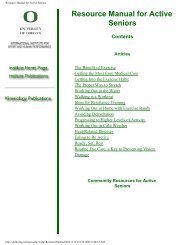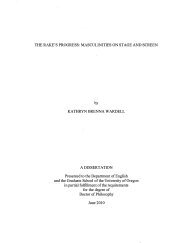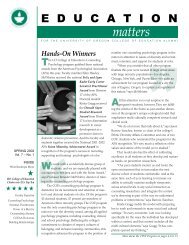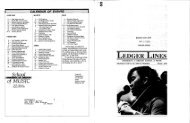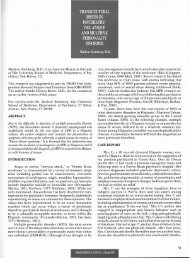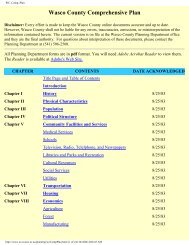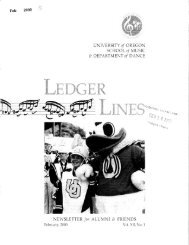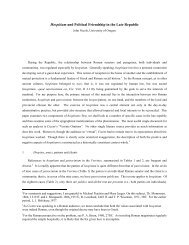~EGULAR SESSION - University of Oregon
~EGULAR SESSION - University of Oregon
~EGULAR SESSION - University of Oregon
Create successful ePaper yourself
Turn your PDF publications into a flip-book with our unique Google optimized e-Paper software.
206 COLLEGE OF LIBERAL ARTS<br />
UPPER-DIVISION COURSES<br />
Psy 334, 335. Social Psychology. 3 hours each term.<br />
Analysis <strong>of</strong> psychological processes in relation to social situations. How languages,<br />
perception, learning, thinking, motivation, and attitudes determine<br />
and result from social interaction and group processes. Prerequisite: Psy 201,<br />
202 or Soc 204,205. Breger, Ellis, Hyman, Wrench.<br />
Psy 401. Research. Hours to be arranged.<br />
Psy 403. Thesis. Hours to be arranged.<br />
Open only to students eligible to work for honors.<br />
Psy 405. Reading and Conference. Hours to be arranged.<br />
Open only to students eligible to work for honors.<br />
Psy 416. Laboratory in Psychological Statistics. 1 hour.<br />
Exercises in computational procedures, testing statistical hypotheses, and<br />
applying correlational methods. Prerequisite: enrollment in Mth 425 or completion<br />
<strong>of</strong> this course or equivalent.<br />
UPPER-DIVISION COURSES CARRYING GRADUATE CREDIT<br />
Psy 407. Seminar. (G) Hours to be arranged.<br />
Psy 417,418. Laboratory in Advanced Psychological Statistics. (G) 1 hour<br />
each term.<br />
Designed to familiarize the student with the principal applications <strong>of</strong> statistical<br />
methods in psychological research. Emphasis on correlational methods,<br />
including partial and multiple correlation, analysis <strong>of</strong> variance, and design <strong>of</strong><br />
experiments. Prerequisite: enrollment in Mth 426, 427 or completion <strong>of</strong> this<br />
sequence or equivalent.<br />
Psy 421, 422. Principles and Methods <strong>of</strong> Psychological Assessment. (g) 3<br />
hours each term.<br />
Application <strong>of</strong> psychological methods to the study <strong>of</strong> the individual; theoretical<br />
and statistical rationale <strong>of</strong> test construction and interpretation; problems involved<br />
in the prediction <strong>of</strong> human behavior; survey <strong>of</strong> psychological assessment<br />
techniques. Goldberg, Davison.<br />
Psy 436. Character and Personality. (g) 3 hours fall, spring.<br />
Major theories <strong>of</strong> personality development and function. Prerequisite: Psy<br />
204 or equivalent. Breger, Davison, Leeper, Sermat.<br />
Psy 439. Somatopsychology. (G) 3 hours.<br />
Psychological effects <strong>of</strong> marked physical deviations, including physical disability<br />
and chronic illness. Application <strong>of</strong> basic principles <strong>of</strong> motivation, perception,<br />
learning, socialization, and adjustment to the behavior and situations<br />
<strong>of</strong> disabled persons. Prerequisite: 9 hours in psychology. Schoggen.<br />
Psy 441, 442. Group and Individual Differences. (G) 3 hours each term.<br />
Basic principles for quantitative assessment <strong>of</strong> human characteristics; research<br />
findings concerning intelligence, achievement, aptitudes, interests, and<br />
personality; group differences related to sex, age, social class, race, nationality.<br />
Tyler.<br />
Psy 447. Introduction to Industrial Psychology. (g) 3 hours.<br />
Application <strong>of</strong> psychological principles to human problems in industrial situations.<br />
Emphasis on the understanding <strong>of</strong> individual needs and motivation;<br />
problems <strong>of</strong> satisfaction and morale; uses <strong>of</strong> group processes. Prerequisite:<br />
Psy 201, 202; or Soc 204, 205 and 3 hours in psychology.<br />
Psy 448. Industrial Psychology. (G) 3 hours.<br />
Problems <strong>of</strong> industrial motivation and morale; prevention <strong>of</strong> fatigue, monotony,<br />
and accidents; principles underlying job analysis and classification;<br />
use <strong>of</strong> psychological tests in the selection and placement <strong>of</strong> employees; interviews,<br />
questionnaires, aptitude scales, and ratings as psychological measures<br />
in personnel work; evaluation <strong>of</strong> service. Prerequisite: introductory courses<br />
in statistics and testing.



